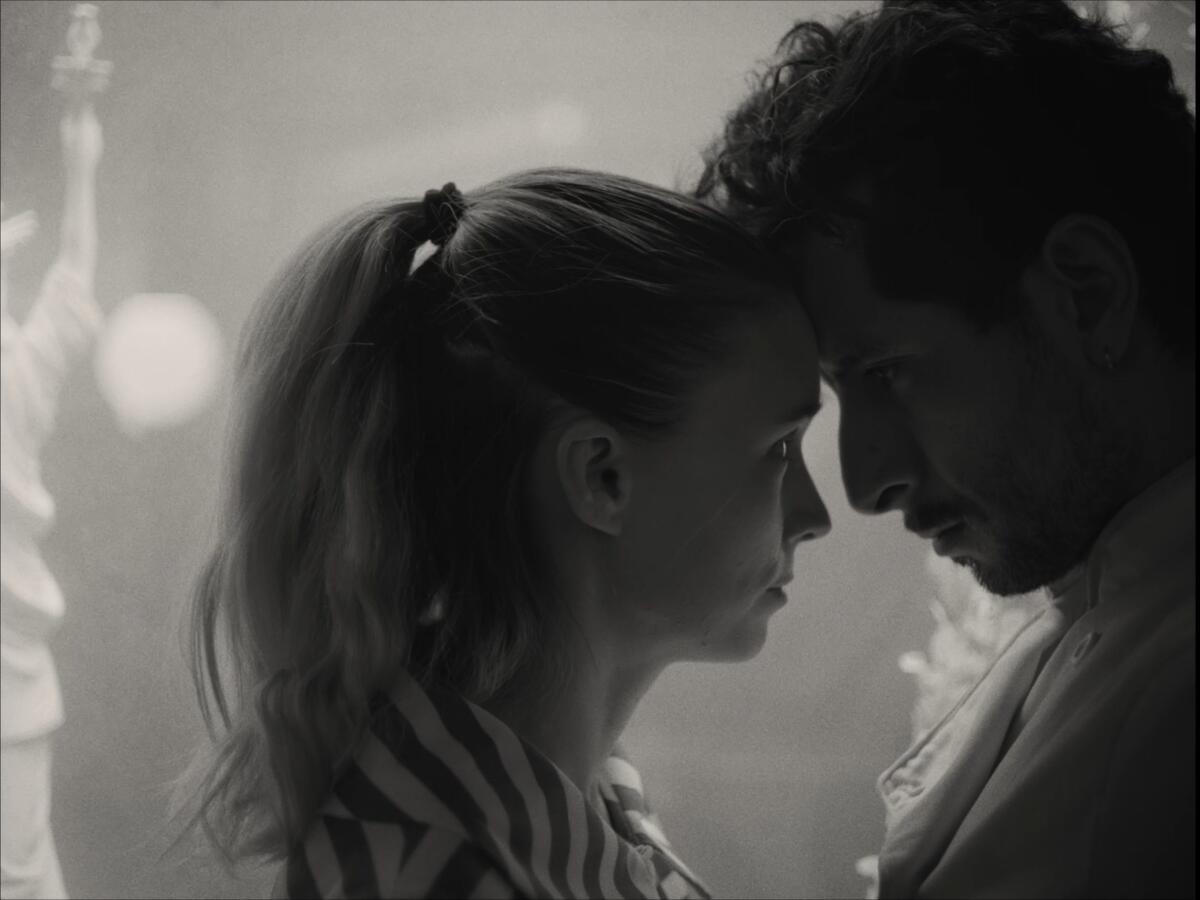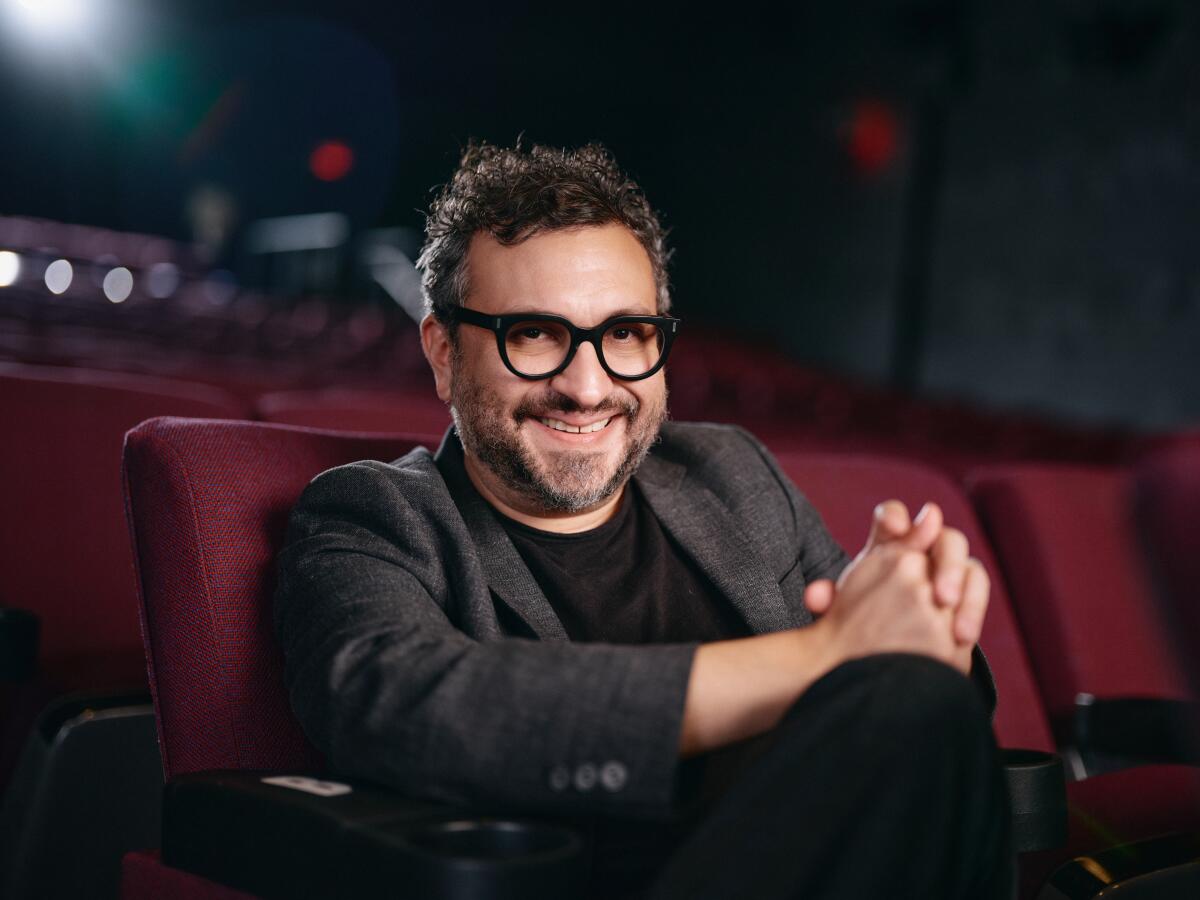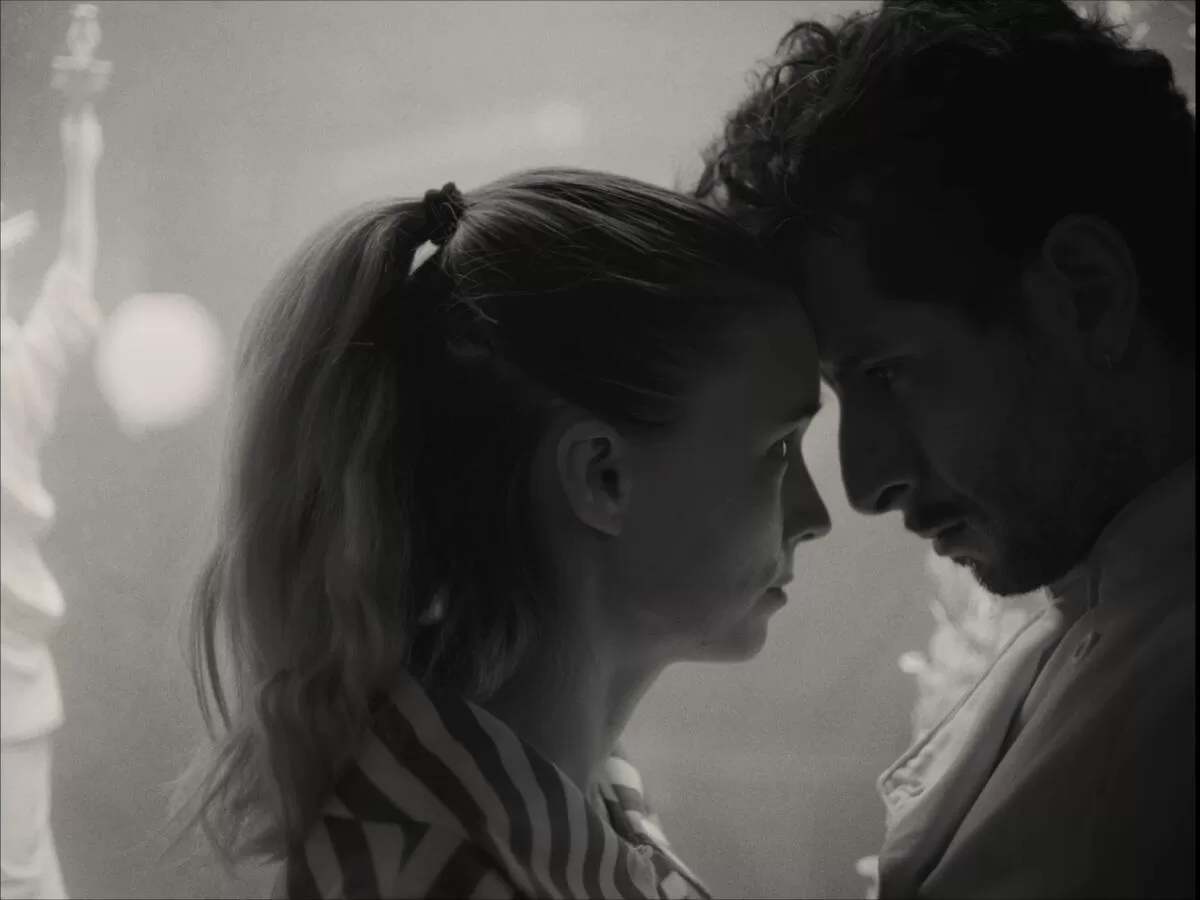I spent 7 years working as a cashier (and as a cook when needed) at a fast-food establishment in Southeast Los Angeles before DACA allowed for other options. It was with a crew of mostly other undocumented people like myself that I shared frustrations and small triumphs alike one late night after another for minimum wage. Beholden to the ticket machine incessantly spitting out orders, we moved at superhuman speed.
The same mechanical monster taunts the staff at the Grill, the fictional Times Square restaurant at the center of Mexican writer-director Alonso Ruizpalacios’ “La Cocina,” a black-and-white reimagining of British author Arnold Wesker’s 1957 play “The Kitchen.”
Almost 70 years after its initial performances, the drama’s warning about prioritizing productivity above humanity remains dishearteningly relevant in our current vicious reality. In theaters Friday, “La Cocina” captures the superficial camaraderie forged in high-pressure jobs where people rely on each other to make it through the day, as well as the dynamics of power in an economic system that thrives on exploiting the most vulnerable — the unseen.
Set in an atemporal New York City (phone booths and old computers coexist alongside more modern references), Ruizpalacios’ adaptation turns the protagonist, Peter, a German in the post-WWII era, into Pedro (Raúl Briones), a rage-fueled Mexican immigrant from Puebla. His brash personality has earned him the respect and scorn of his co-workers in equal measures.
When money from the register goes missing, Pedro becomes a prime suspect. The amount curiously matches the exact cost of the abortion he reluctantly agrees to pay for when his waitress girlfriend Julia (Rooney Mara) reveals she is pregnant.

Rooney Mara and Raúl Briones in the movie “La Cocina.”
(Willa)
An investigation gets underway amid the daily catastrophes typical of any intense food-service environment (loss of tempers, crying in frustration). Here the strong abuse the weak. It’s a microcosm of the world and its vices, and not only because the sounds of several languages permeate the steamy premises.
Ruizpalacios first read “The Kitchen” while studying acting in London in the 2000s. At the time, he worked at the kitschy Rainforest Café in Piccadilly Circus — a now-defunct theme restaurant with animatronic animals — to help pay for his tuition. His fascination with kitchens and their rhythms came from that firsthand experience.
From those days, Ruizpalacios remembers a French Algerian co-worker named Samira, the only woman in the kitchen and a tough salt-of-the-earth motherly figure. A character directly inspired by Samira (and named after her) appears in “La Cocina.”
“She was very demanding and took no s—, but when s— hit the fan, she would be the only person to lend you a helping hand,” Ruizpalacios, 47, recalls on Zoom from his home in Mexico City. “She would always say, ‘Come on, Mexican, come on. Where are you?’”
With no connection to Rooney Mara but a conviction that she would be ideal for the role of Julia, a bold Ruizpalacios wrote her a letter detailing why she should take a risk and go down to Mexico City to make an indie movie with a group of mostly unknown actors.
“Pedro sees Julia as a sort of movie star,” says Ruizpalacios. “I knew casting someone like Rooney, who is well-known and has that movie-star aura, would add to the relationship.” It was the juxtaposition of Mara’s potent, sinewy turn in “The Girl with Dragon Tattoo” and the nuanced fragility she exuded in “Carol” that confirmed his admiration for her performances.
To his surprise, Mara responded positively to his “message in a bottle at sea.”

“I haven’t really done real theater as an adult, but it felt very close to that because we were doing these long, full takes and there was so much energy,” says Mara of Ruizpalacios’ working methods.
(Marcus Ubungen / Los Angeles Times)
“I’ve read quite a few of them and it’s always really nice to get a letter like that, but I wouldn’t say that they’re always necessarily very effective,” Mara, 39, tells me on a video call from her home in Los Angeles, dressed in a plain gray T-shirt with her hair tied up in a half-ponytail. “But there was something poetic about his letter that really touched me and made me very curious about him and about his script.”
Mara requested Ruizpalacios’ previous films (he sent her his two acclaimed Mexico City-set breakthroughs, 2014’s coming-of-age dramedy “Güeros” and 2018’s heist movie “Museo”), and soon after she agreed to star in “La Cocina.”
“My time is very precious now that I have kids,” Mara says. “To me now, the experience is so important. I’m like: Is this going to be a worthwhile experience? Is it something I can grow from? And everything about the way Alonso wanted to make the film to me was like, ‘Yes, this is an experience I’d like to have.’ It seemed different than anything I had done thus far.”
Back in 2010, Ruizpalacios directed a stage version of “The Kitchen.” Briones, then a student of Ruizpalacios’ acting courses, had a much smaller role as the immigrant restaurant owner demanding his missing funds, and later as a vagabond who wanders into the kitchen. “Pedro exists between these two archetypes: the immigrant who made it and the pariah,” the actor says on the phone from Mexico City. “He’s fighting to be the master of his own life.”
But despite having worked with Briones over the years, including in his previous film, 2021’s docufiction “A Cop Movie,” the director didn’t immediately cast the actor as Pedro. His hesitation came from knowing Briones didn’t speak English, a requirement for the part.
“One of his greatest qualities as an actor is his discipline,” Ruizpalacios says of Briones.

“Kitchens are very much like a pirate ship and the way we designed and conceived our kitchen was also like a submarine,” says Ruizpalacios.
(Marcus Ubungen / Los Angeles Times)
The actor learned the foreign tongue well enough to hold his own in multiple scenes with Mara in just three months. “I would challenge anyone to dominate another language in that time and feel comfortable enough to act in it,” Ruizpalacios says about his lead’s commitment.
For Briones, learning English — even in the movie’s limited capacity — had an empowering effect. In Mexico, those who grow up attending public schools, as was his case, don’t have access to a bilingual education. For a long time, Briones refused to speak or learn the language as a self-defense mechanism against the mockery he’d experience from others.
“Pedro has been a great teacher for me,” Briones says of his bilingual character who can advocate for himself. “Pedro’s obsession with speaking English has a survival reason, and my decision to not speak it did as well.” When presented with the opportunity to play the lead, Briones took a more technical approach to learning English with the help of fellow “La Cocina” actor María Fernanda Bosque, who served as his impromptu coach.
Exteriors for “La Cocina” were shot on location in New York City (around Times Square including Junior’s Restaurant & Bakery as the front of the Grill), but for the kitchen itself, Ruizpalacios wanted to play in his home turf. The director had long dreamed of working at Mexico City’s famed Estudios Churubusco, the soundstages where many classics from the national cinema’s Golden Age were made. This also allowed for more control over the design of the kitchen.
“Kitchens are very much like a pirate ship and the way we designed and conceived our kitchen was also like a submarine,” Ruizpalacios says. And since kitchens tend to be male-dominated spaces, the director hired a traditional all-male Welsh choir to sing the lyrics to the Mexican song “Un Puño de Tierra” (A Fistful of Dirt) translated into Welsh on top of music by composer Tomás Barreiro. The existentialist lyrics speak about the futility of material pursuits.
The track comes on during Pedro’s most emotionally charged moments: when he looks at the pictures of his family (they’re photos from Briones’ actual childhood) and when he calls his mother back home (the person who answers is Briones’ own mother).
“That song became the beating heart of the film,” says Ruizpalacios.
For the rehearsal process Ruizpalacios brought together his cast, with the exception of Mara, in Mexico City for a month. In the mornings they all took cooking classes and in the afternoons they participated in improvisation exercises to build a natural rapport. Though she regrets missing it, Mara believes that ultimately being absent from the in-person preparation aligned with her character’s position as an outsider.

“There are times where I’ve made decisions and done things that I probably shouldn’t have,” says Mara. “[There’s] a time in your life where you just want to work because you don’t want to be in your life. And then in the last six years I’ve barely worked at all.”
(Marcus Ubungen / Los Angeles Times)
“When you become a parent, there’s a carefree part of your life that no longer exists,” says Mara. “My character is a mom, and that’s the thing that separates her from her co-workers.”
Over time, prioritizing her children has made Mara herself increasingly selective. “There are times where I’ve made decisions and done things that I probably shouldn’t have,” Mara says. “[There’s] a time in your life where you just want to work because you don’t want to be in your life. And then in the last six years I’ve barely worked at all. I’ve done, like, two things.” (Those two things were Guillermo del Toro’s “Nightmare Alley” and Sarah Polley’s “Women Talking.” Mara knows how to pick them.)
“La Cocina” consistently proved to be an invigorating escape for her. One of the most technical astounding sequences takes place during a lunch rush. The kitchen turns into a madhouse with cooks working and waitresses fighting to get their orders out first, all while the floor is flooded with soda.
“We shot it over several days, and it was very much like a choreographed dance,” recalls Mara. “I haven’t really done real theater as an adult, but it felt very close to that because we were doing these long, full takes and there was so much energy.”
The sequence emerged from one of Ruizpalacios’ personal memories. On Christmas Eve in New York City 13 years ago, the director and his wife, actor Ilse Salas, visited a Times Square multiplex. When buying concessions, he realized the carpet was drenched. The liquid was coming from a broken Cherry Coke machine “spilling like an endless spring,” he recalls, as if coming from “the center of the Earth.”
“Nobody paid any attention to it,” he recalls. “It just kept pouring and flooding the whole place. And the people just kept working, ignoring it. I thought that was the perfect image of late-capitalism.” The couple watched “The Girl with the Dragon Tattoo” starring Mara. “I said to my wife, ‘One day I’m going to work with her,’ so this movie closed that circle.”
With the help of the Mexican Coalition, an organization that supports immigrant families, Ruizpalacios interviewed several undocumented kitchen workers in New York City about their daily experiences. Those interactions were essential to his research and writing process.“Listening to them you realize that no one has ever asked them about their story,” says Ruizpalacios.
“Mexicans are considered great workers around the world and that’s very positive, but it is also due to the fact that we are obedient and being obedient is very convenient to the system,” Briones says. “Pedro is not obedient. Disobedience is revolutionary.”
For the U.S. release of “La Cocina,” the distributor Willa partnered with One Fair Wage, a restaurant workers’ advocacy group, to present a series of screenings and events. Recently, a video presentation featuring clips from the film with documentary footage of NYC restaurant workers was shown on the enormous curved NASDAQ billboard in Times Square. Ruizpalacios always had this kind of visibility in mind for the men and women who sacrifice their physical and mental well-being to provide a service that most take for granted.
“In ‘La Cocina’ we don’t care about the customers,” he says. “This time they are the extras. That is the point of the film.”
